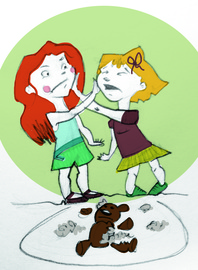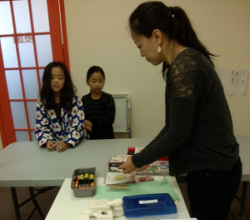Kid's View
 Illustration by Ali Pili
Illustration by Ali Pili But, even though we fight a lot and she gets really annoying some times, Angie plays with me and shares the bed with me. She is a great puppeteer when we play with dolls. When we are at home, she is my only friend! I am creative with designs and she is creative with drawing. I love scrapbooking and she loves drawing. I love music in school and she loves art! Having a sibling may not be so bad after all. It has good and bad sides. But I wouldn’t want to be the only child; I’m lucky to have a sister to play with.
Parent's View
 Ellen teaching a seminar on Card making at Voice K
Ellen teaching a seminar on Card making at Voice K As a mother of two girls, I am no stranger to sibling rivalry. I lost count how many times I have divided the M&M’s into precise equal portions or bought each girl a new dress when only one really needed it. Experts say typically sibling rivalry worsens when they are close in age (a year or two apart), and it often increases further between two children of the same sex. Well, I am in luck; my girls are twenty months apart. And they are very different. As I joked to a schoolteacher who has taught both of my girls: “Same manufacture, completely different products.”
My first born, Dea, is very adventurous, bubbly, and has a quick grasp for things. Her younger sister, Angie, is sensitive, artsy, and introverted. So their personality clashes are constant. Lots of times there is one girl in tears, or both are mad complaining about the smallest thing. It can be frustrating and tiring at times, especially when you have work or household chores lined up to get done. Having to drop everything and play referee is one way out. I also try to prevent it from happening in the first place. Here are some tips I have learned over the years:
- Set limits. Give clear messages about how you expect your kids to behave toward one another before arguments arise. “That’s a rude thing to say to your sister, do you want to be treated the same way?”
- Teach the children to view things from their sibling’s perspective or their parent’s perspective. Ask them to imagine to step into their sibling or parent’s shoe, and ask them how they would handle the situation. Often times when they are calmer and think back, they realize they have to be sensitive to each other.
- Try not to make comparisons. Each child is born differently. Although it is very tough to not think things like “At the same age, her older sister could tie her shoes already,” or “Why can’t you draw pictures with details like your sister,” each child has her unique strengths and weaknesses.
- When possible, let children settle their own differences. If the kids expect parents to always resolve their problems, then they are not learning the skills of conflict resolution on their own. When you do get involved, try to be fair and listen to all sides of the story.
- Teach kids “Blood is thicker than water.” Friends come and go, siblings are forever. Your brothers and sisters are your live-in support system.
Being a mother is the most challenging job I have had, and it doesn’t come with a job description or a menu. You try your best and play it by ear sometimes. Hopefully I am not damaging my children too much.

 RSS Feed
RSS Feed